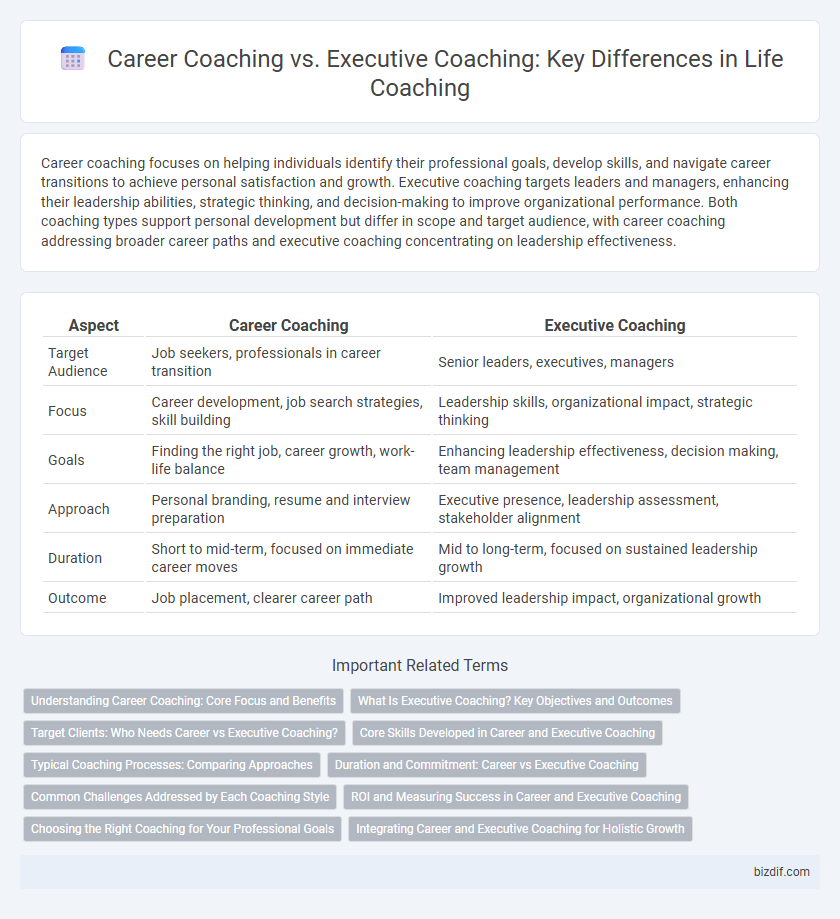Career coaching focuses on helping individuals identify their professional goals, develop skills, and navigate career transitions to achieve personal satisfaction and growth. Executive coaching targets leaders and managers, enhancing their leadership abilities, strategic thinking, and decision-making to improve organizational performance. Both coaching types support personal development but differ in scope and target audience, with career coaching addressing broader career paths and executive coaching concentrating on leadership effectiveness.
Table of Comparison
| Aspect | Career Coaching | Executive Coaching |
|---|---|---|
| Target Audience | Job seekers, professionals in career transition | Senior leaders, executives, managers |
| Focus | Career development, job search strategies, skill building | Leadership skills, organizational impact, strategic thinking |
| Goals | Finding the right job, career growth, work-life balance | Enhancing leadership effectiveness, decision making, team management |
| Approach | Personal branding, resume and interview preparation | Executive presence, leadership assessment, stakeholder alignment |
| Duration | Short to mid-term, focused on immediate career moves | Mid to long-term, focused on sustained leadership growth |
| Outcome | Job placement, clearer career path | Improved leadership impact, organizational growth |
Understanding Career Coaching: Core Focus and Benefits
Career coaching centers on helping individuals identify their strengths, clarify career goals, and navigate job transitions to achieve long-term professional satisfaction. It fosters skill development in areas such as resume building, interview preparation, and networking strategies to enhance employability and career growth. This coaching approach benefits individuals seeking clarity in career direction and actionable plans for advancement in various industries.
What Is Executive Coaching? Key Objectives and Outcomes
Executive coaching is a specialized form of career coaching designed to enhance the leadership capabilities of senior managers and executives within an organization. Key objectives include improving strategic decision-making, fostering effective communication, and driving organizational change to achieve business goals. Outcomes often involve increased leadership effectiveness, better team performance, and accelerated career advancement for executives.
Target Clients: Who Needs Career vs Executive Coaching?
Career coaching primarily targets individuals seeking guidance on job transitions, skill development, and career direction, including recent graduates, mid-level professionals, and those changing industries. Executive coaching focuses on senior leaders and top executives aiming to enhance leadership capabilities, strategic decision-making, and organizational influence. Understanding these distinctions helps tailor coaching approaches to meet the unique needs of career-driven individuals versus high-level corporate leaders.
Core Skills Developed in Career and Executive Coaching
Career coaching hones goal-setting, resume building, and interview preparation skills tailored for career transitions and job seekers. Executive coaching sharpens leadership, strategic thinking, and decision-making abilities aimed at enhancing organizational impact and C-suite effectiveness. Both coaching types develop communication and self-awareness but target different professional growth phases.
Typical Coaching Processes: Comparing Approaches
Career coaching typically involves goal setting, skill assessment, and personalized action plans to help individuals identify career paths and overcome job-related challenges. Executive coaching focuses on leadership development, strategic thinking, and organizational impact through tailored sessions that enhance decision-making and interpersonal skills. Both approaches utilize feedback mechanisms and progress evaluations but differ in scope and emphasis according to client needs.
Duration and Commitment: Career vs Executive Coaching
Career coaching typically spans several months, offering flexible sessions focused on job search strategies, skill development, and career transitions, requiring moderate commitment from clients. Executive coaching often involves a longer-term engagement, usually six to twelve months, with intensive sessions designed to enhance leadership capabilities, strategic thinking, and organizational impact, demanding higher commitment and consistent participation. The duration and level of commitment differ significantly, reflecting the distinct goals and depth of transformation targeted in career versus executive coaching.
Common Challenges Addressed by Each Coaching Style
Career coaching primarily addresses challenges such as navigating career transitions, setting professional goals, and improving job search strategies. Executive coaching focuses on leadership development, enhancing decision-making skills, and managing organizational change. Both coaching styles aim to boost performance but cater to different stages and roles within a professional journey.
ROI and Measuring Success in Career and Executive Coaching
Career coaching delivers measurable ROI by enhancing job satisfaction, improving skill sets, and increasing employability, which often leads to higher salary offers and career advancement opportunities. Executive coaching focuses on leadership development, strategic decision-making, and organizational impact, resulting in improved business performance, team productivity, and tangible financial gains such as increased revenue and market share. Measuring success in career coaching involves tracking individual progress and career milestones, while executive coaching success is evaluated through key performance indicators (KPIs), 360-degree feedback, and business outcomes.
Choosing the Right Coaching for Your Professional Goals
Career coaching targets individuals seeking to explore career paths, improve job search strategies, and develop skills for professional growth. Executive coaching focuses on enhancing leadership abilities, strategic thinking, and performance for senior executives and managers. Selecting the right coaching depends on your role, aspirations, and whether you need broad career development or specialized leadership guidance.
Integrating Career and Executive Coaching for Holistic Growth
Integrating career coaching and executive coaching enables professionals to achieve holistic growth by aligning personal aspirations with organizational leadership demands. This combined approach enhances self-awareness, strategic thinking, and decision-making skills essential for navigating complex career paths and executive roles. Leveraging tools from both disciplines fosters a cohesive development plan that supports long-term career advancement and leadership effectiveness.
Career coaching vs Executive coaching Infographic

 bizdif.com
bizdif.com